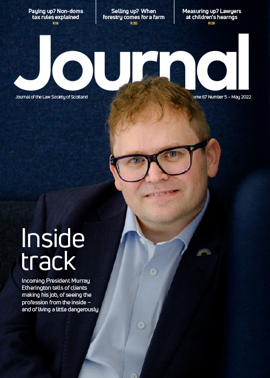Editorial: Ball in their court
For many years the received wisdom – and likely truth – was that lawyers taking action for better rates for legally aided work were unlikely to command much public sympathy. “Legal aid fat cats” was an easy cliché for those sections of the press that half the time seem to think the money goes direct to the accused.
Politicians in Government were being only human in catching the mood and pushing the profession’s case, however well presented, to the bottom of the in tray. So warnings that ministers were sowing the seeds of long term decline, which would one day catch up with them, were doomed always to fall on deaf ears. That day would always be someone else’s problem.
No longer. Last month I concluded a brief observation on where we are with the comment: “Some time soon, something in the system will surely give.” Hardly had I done so than the Scottish Solicitors’ Bar Association announced that its members would no longer act in summary prosecutions for the complex “coercive control” type of domestic abuse cases that are liable to arise under the recent flagship, and groundbreaking, legislation targeting such conduct. These, the SSBA said, were just too complex to run under fixed fee rates that were never intended for cases requiring such levels of investigation.
We might have expected some public backlash. Most likely, even now, only a minority are aware of the crisis facing the defence bar and the risk that there will soon not be enough lawyers to represent all those brought before the courts. Instead, however, we have the Scottish Women’s Rights Centre, representing those with perhaps the greatest interest in seeing swift and effective justice, coming out in support of the profession.
“We are understanding of the challenges being faced by the criminal bar in Scotland regarding their ability to properly represent clients in these cases”, it said in a statement, recognising that legal aid must be adequately funded to ensure access to justice and “to ensure that the system, for protecting survivors and women affected by violence and abuse, is effective in practice”.
Possibly wrongfooted by the SSBA’s move, the Scottish Government appears unsure what to do next, and to be saying as little as possible in public. That cannot continue for long; certainly the longer its inactivity persists, the more intractable the problem will become.
I throw out one suggestion as at least an initial move that might show goodwill and get cases moving again, while leaving for further discussion the overall rates on offer: identify those types of summary case that take more than a given number of hours’ work on average, and set an enhanced fixed fee. Even that may take a bit of haggling, but what alternatives are being proposed? For everyone’s sake, most especially the vulnerable in need of protection, let’s see some action.






